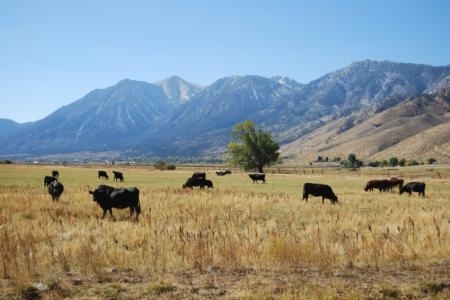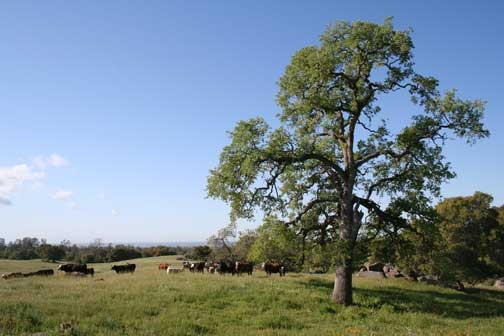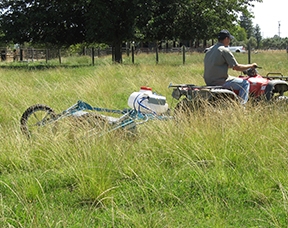Posts Tagged: Josh Davy
Rain has painted California rangeland green
Steady rain so far this fall has produced a verdant emerald green panorama on California rangeland, reported Capital Press this week.
Livestock producers are elated, said Josh Davy, a UC Cooperative Extension advisor in Tehama County.
"It's been nice to start the year with some big rains because it fills up the reservoirs, puts some drinking water out there and it helps build deeper soil moisture in case it doesn't rain later," Davy said. "We hope it keeps going until March."
The 2012 rainy autumn has helped much of Northern California emerge from drought conditions, according to the U.S. Drought Monitor. Parts of the southern San Joaquin Valley are still in severe drought, but conditions have shown some improvement.
UC Davis olive center to look at ways to reduce wastewater
Melanie Turner, Sacramento Business Journal
The UC Davis Olive Center and USDA-Agricultural Research Service have been awarded a grant to develop innovative ways to reduce the amount of wastewater produced by the olive oil industry. Among the technologies to be evaluated is a “vibrating membrane system” patented by New Logic Research of Emeryville. The company will be providing the system for testing at no cost.
It's beginning to look like drought
California's long dry spell is prompting the media to begin contemplating the specter of another drought. Matt Weiser of the Sacramento Bee wrote that the dreaded D-word is back.
Among the first farming operations to be affected by lack of rain is livestock grazing, which is largely dependent on rainfall to grow forage for cattle and sheep, and to fill stock ponds the animals need for drinking water.
Josh Davy, livestock and range farm advisor with the University of California Cooperative Extension in Tehama, Colusa and Glenn counties, said many livestock owners are in a waiting game. They're hoping for rain but are also making plans to buy supplemental feed in case it doesn't.
Another option for some, he said, is to begin selling off animals early to reduce herd size, thereby ensuring grazing lands can sustain the animals they keep.
"People are right on the teetering edge," Davy said. "We're going to have a lot of grass start dying here if we don't start getting some kind rains."
Some stone fruit and nut crops are also at risk. With these crops, such as almonds and peaches, root growth precedes bud growth. Without soil moisture, the roots don't grow, and then the trees don't bud out. That means less fruit production, said Roger Duncan, a fruit tree advisor at the Cooperative Extension office in Stanislaus County.
"They're starting to get concerned," said Duncan. "There is no such thing as normal. But I don't remember it being quite like this. We really could use the rain."
California's fall weather is getting rangeland grasses growing
Germination occurred as a result of the season's first rains in October, but it didn't hold in some pastures because of the lull in precipitation, Davy said.
"This ought to get it up and going," Davy said of the rain that fell before Thanksgiving. "It usually takes between half and 1 inch in a week to get it sparked up and going, and we have definitely had that."
California farmers efficient, study finds
Tim Hearden, Capital Press
A Fresno State Center for Irrigation Technology research report says California farmers are more efficient in managing their water supplies than they're sometimes given credit for. As a result, large volumes of "new water" cannot be developed through agricultural water conservation.
The Fresno State irrigation experts' yearlong study aimed to update a 1982 University of California Cooperative Extension report, "Agricultural Water Conservation in California with Emphasis on the San Joaquin Valley." The new study says the 1982 report correctly framed the potential for agricultural water-use efficiency.
'Rotary wiper' helps control smutgrass in pastures
The Tehama County Resource Conservation District has purchased a rotary wiper, which it will rent to farmers, ranchers and landowners interested in using this herbicide application technology to control weeds, the RCD announced in a press release.
Sprays and granular applications of herbicides place the chemical near the ground, but the rotary wiper applies an herbicide to weeds that are taller than the desired plants. The equipment allows the operator to set the height of the rotating wiper and brush herbicide onto stems and the underside of leaves, where the herbicide is more readily absorbed.
Last year, UC Cooperative Extension advisors experimented with the rotary wiper to control smutgrass on pastures. As the name implies, livestock do not like smutgrass. Since they avoid it, smutgrass quickly dominates irrigated pastures causing significant reductions in livestock grazing capacity. According to the RCD, an invasion of smutgrass is occurring in Sacramento Valley irrigated pastures.
"(The rotary wiper) is a very economical tool, especially considering the cost of spraying a whole pasture and having to re-establish it," the RCD press release quoted UC Cooperative Extension natural resources advisor Josh Davy. "It's great to have another tool that helps to control smutgrass, which is a weed that can devastate pasture production."
The research found that the desirable plants must be shorter than the smutgrass for the rotary wiper to work effectively. Davy recommends the field be grazed heavily before wiping so that weeds are taller than desirable grasses and clover.
The RCD press release was picked up by the Tehama County Daily News.

rotarywiper




